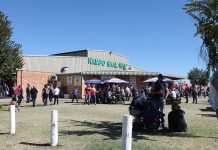The mini budget framework provides for a 11,3% increase in welfare spending over the next three years and a 5,8% increase in money spent on infrastructure. “South Africans need jobs rather,” said Mike Schussler, chief economist at T-Sec.
According to Schussler the mini budget is definitely leaning more towards the left. But Manuel denied this in a press conference. The minister budgeted for increased spending of Rr171 billion over the next three years, Rr60 billion of which will go to Eeskom.
The major spending priorities are education and skills development, health care, crime, public transport, water, sanitation, electricity, housing, and fighting rural poverty by increasing rural incomes, extending access to land and support for emerging farmers.According to Ulrich Joubert, an economist at Kruger Iinternational, focusing on welfare instead of the productive side of the economy like agriculture, mining and industry, will not solve SA’s problems.
“How is welfare spending going to boost long-term growth potential?” he asked. “if almost 13 million people are dependant on welfare, how long will the economy be able to sustain them without positive growth?” Joubert said it’s often too easy for unemployed South Africans to live off child grants and pensions instead of finding jobs. “At least the government old age pension is still a little below minimum wage, which helps to counter the problem,” he said.
Old age and disability grants were increased by R20 to R960 a month in the mini budget, compared to the minimum wage for farmworkers in rural areas at R989, according to the department of labour’s website. The child support grant is now R230 a month, after a R10 increase in April and a R20 increase in Dr John Purchase, CEO of the Agricultural Business Chamber (ABC), reckons the mini budget doesn’t signal a move to the left.
“A R20 increase in child support is not a lot; some people would say it’s not enough,” he said. “The fact is we have a problem with high food prices and people have to eat.”dr purchase said given the current economic circumstances, the ABC is fairly happy with the mini budget. “Obviously we would have liked to have seen more investment in agriculture, but we’re moving into a budget deficit, so there’s not a lot of extra money to spend.” – Drieka Burger








